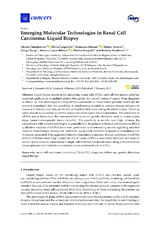Emerging Molecular Technologies in Renal Cell Carcinoma: Liquid Biopsy
Autor
Cimadamore, Alessia
Gasparrini, Silvia
Massari, Francesco
Santoni, Matteo
Cheng, Liang
López-Beltrán, Antonio
Scarpelli, Marina
Montironi, Rodolfo
Editor
MDPIFecha
2019Materia
Renal cell carcinomaCirculating DNA
CTC
Diagnosis
Follow-up
Genetic alteration
Target therapy
METS:
Mostrar el registro METSPREMIS:
Mostrar el registro PREMISMetadatos
Mostrar el registro completo del ítemResumen
Liquid biopsy, based on the circulating tumor cells (CTCs) and cell-free nucleic acids has potential applications at multiple points throughout the natural course of cancer, from diagnosis to follow-up. The advantages of doing ctDNA assessment vs. tissue-based genomic profile are the minimal procedural risk, the possibility to serial testing in order to monitor disease-relapse and response to therapy over time and to reduce hospitalization costs during the entire process. However, some critical issues related to ctDNA assays should be taken into consideration. The sensitivity of ctDNA assays depends on the assessment technique and genetic platforms used, on tumor-organ, stage, tumor heterogeneity, tumor clonality. The specificity is usually very high, whereas the concordance with tumor-based biopsy is generally low. In patients with renal cell carcinoma (RCC), qualitative analyses of ctDNA have been performed with interesting results regarding selective pressure from therapy, therapeutic resistance, exceptional treatment response to everolimus and mutations associated with aggressive behavior. Quantitative analyses showed variations of ccfDNA levels at different tumor stage. Compared to CTC assay, ctDNA is more stable than cells and easier to isolate. Splice variants, information at single-cell level and functional assays along with proteomics, transcriptomics and metabolomics studies can be performed only in CTCs.

